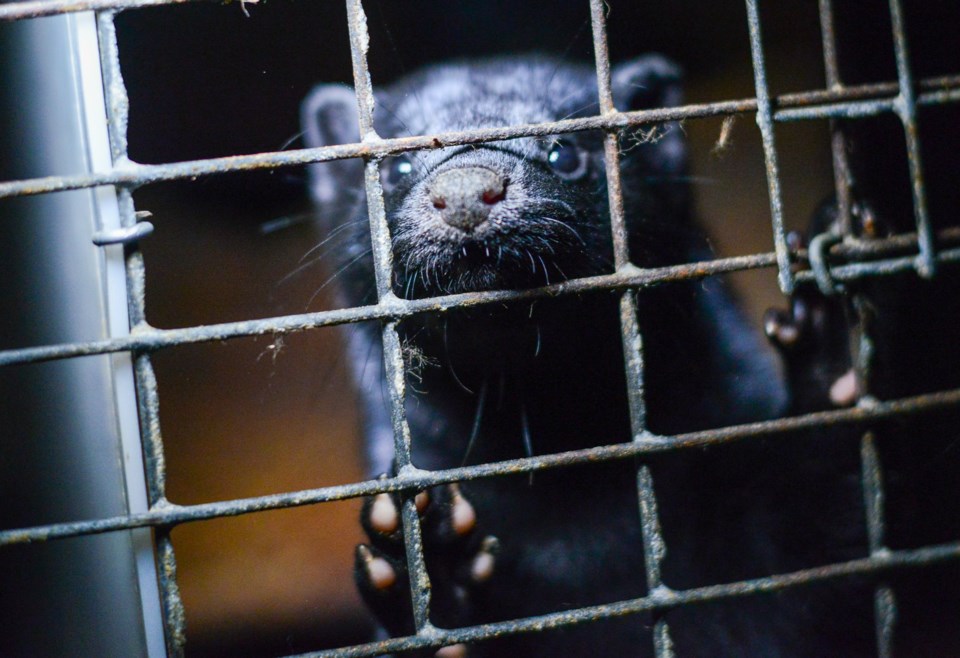A non-profit agency whose stated mission is to protect fur-bearing animals through conservation, advocacy, research and education says 80 per cent of British Columbians support a ban on fur farming in the province.
The Fur-Bearers recently commissioned Research Co. to ask 804 adults whether they opposed or supported a fur farming ban in B.C. The results showed 61 per cent of respondents “strongly support” a ban, and a further 19 per cent “moderately support.”
Aaron Hofman, director of advocacy and policy for Fur-Bearers, said the agency has previously polled British Columbians and conducted polls federally. But, he added, the Research Co. results have shown the strongest support yet for a fur farming ban.
“I think the public understands that fur farming is a practice that belongs to the past — to an old era — and that some people's attitudes towards the treatment of animals have shifted considerably,” Hofman said. “We see that people do want wildlife to be protected and not farmed for their fur.”
He said the results are a testament to public attitudes and the misalignment of government policies regarding fur farming. The poll question showed only 10 per cent of respondents opposed a ban on fur farming, with another 10 per cent “not sure.”
What Hofman found interesting is that there was common ground among the respondents who identified which political party they voted for in the last provincial election. A total of 81 per cent of respondents who voted for the NDP, Liberals and Greens support a ban.
“So it's not a partisan issue where it's left or right — it's all British Columbians,” he said.
Equally, the ethnicity of the respondents — First Nations, European, East Asian and South Asian — was consistent among people who supported a ban. Same goes for the areas of the province where the respondents live — Metro Vancouver, Fraser Valley, northern B.C., southern B.C. and Â鶹´«Ã½Ó³»Island.
Mink farming ban
The B.C. government banned mink farming in 2021 because of public health risks identified during the COVID-19 pandemic. But the ban did not include other species legally allowed to be farmed for their fur, including chinchillas, martens, foxes, fishers and nutrias.
Fur-Bearers recently obtained an application for a fur farm via a Freedom of Information and Protection of Privacy Act request. The heavily redacted application did not identify the applicant, location or exact number of animals to be farmed.
However, the application does indicate licence fees of $12 and $24 for “one to 25 fur bearing animals” and “26 or more fur bearing animals.” The application, which was filed in September 2023, isn’t clear which category the applicant chose.
A spokesperson for B.C.’s Ministry of Agriculture and Food said in an email this week that the application in question “did not proceed.” The ministry said there is only one fur farm operating in the province.
It’s in the Cariboo region, and it has 15 chinchillas.
“The animals are not being bred,” the ministry spokesperson said.
B.C. Supreme Court
In 2021, the Fur-Bearers filed a petition for judicial review after learning that the ministry issued a fur farming licence to a B.C. chinchilla farm that didn’t have a health management plan in place.
At the time, the agency argued such a plan includes important information related to animal welfare, disease control and other items that are necessary to have documented for a fur farm to operate in the province.
Court documents indicate the farm owned by Earl Donald Giles had operated a licensed fur farm since at least 2000. Known as E&S Chinchilla Enterprises, it was British Columbia’s only chinchilla fur farm at the time, according to the documents.
In August 2022, a B.C. Supreme Court judge dismissed the request for a judicial review of the issuance of the licence to Giles.
Madam Justice Sheila Tucker ruled the absence of a health management plan was “reasonable,” arguing the province’s chief veterinarian can work with licensees to ensure a plan is in place after a licence is granted.
The Ministry of Agriculture wouldn’t disclose the name of B.C.’s only fur farm or say whether it was operated or connected to Giles. The chinchilla farm licence before the courts in 2021 was located in Buffalo Creek, near 100 Mile House in the Cariboo region.
"The location of the farm is not being released as per Section 16.1 of the Animal Health Act, which prohibits the disclosure of information that would identify a specific place where an animal is located," the ministry spokesperson said.



